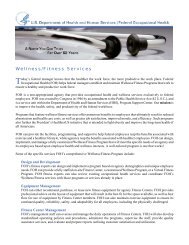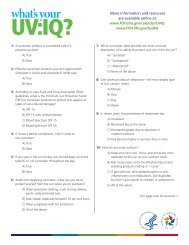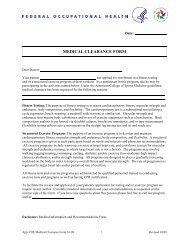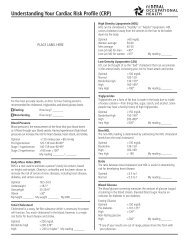Helping Others Cope With Grief - U.S. Department of Health and ...
Helping Others Cope With Grief - U.S. Department of Health and ...
Helping Others Cope With Grief - U.S. Department of Health and ...
Create successful ePaper yourself
Turn your PDF publications into a flip-book with our unique Google optimized e-Paper software.
A LifeCare® Guide to <strong>Helping</strong> <strong>Others</strong> <strong>Cope</strong> <strong>With</strong> <strong>Grief</strong>Remember your co-worker on important days such as holidays or theloved one’s birthday or death anniversary. Send a card, call or visit. Letyour co-worker know that you remember, too.Keep in mind that many co-workers may not want to reach out for help becausetheir loss is so personal or they fear that they may be a burden to others. If yourco-worker is struggling after a loss, it may be up to you to take the initiative <strong>and</strong><strong>of</strong>fer help.Employee Assistance Plans (EAPs) are counseling services <strong>of</strong>fered by many employersto help workers <strong>and</strong> their eligible family members resolve emotional problems(such as alcohol <strong>and</strong> drug abuse, emotional <strong>and</strong> personal issues, legal matters, stressreduction, grief <strong>and</strong> bereavement <strong>and</strong> more). EAP counselors are fully qualified <strong>and</strong>licensed in their areas <strong>of</strong> service. They typically include licensed psychologists, socialworkers, counselors <strong>and</strong> other staff. Usually with this service, the employee <strong>and</strong> hisor her dependents are entitled to receive a set number <strong>of</strong> counseling sessions free <strong>of</strong>charge. If applicable, check with your employer to find out if your organization<strong>of</strong>fers this benefit or any other type <strong>of</strong> grief counseling.<strong>Helping</strong> Children <strong>Cope</strong> <strong>With</strong> <strong>Grief</strong> <strong>and</strong> DeathAlthough there is always a strong desire to protect children from pain, children (likeadults) may have to face the pain caused by the death <strong>of</strong> a loved one. Children maybe acutely aware <strong>of</strong> the absence <strong>of</strong> their loved one <strong>and</strong> the emotional tension aroundthem, even if they don’t have a full underst<strong>and</strong>ing <strong>of</strong> what has happened.Children also must work through the tasks <strong>of</strong> grief, but they must do so with greaterlimits on their level <strong>of</strong> underst<strong>and</strong>ing, less developed coping skills, <strong>and</strong> with lesscontrol over their external world. While it was once believed that children “gotover” their grief relatively quickly, it is now understood that their sadness <strong>and</strong> griefis a process that they experience differently as they age <strong>and</strong> mature. Their underst<strong>and</strong>ing,not only <strong>of</strong> death but also <strong>of</strong> themselves in relationships, grows as theyage, <strong>and</strong> they will continue to re-examine <strong>and</strong> re-experience their loss. This sectiondiscusses how children respond to death, <strong>and</strong> how to support <strong>and</strong> guide a grievingchild through the grief process in a healthy way.How Children Respond to DeathA child’s developmental level will influence the way he or she underst<strong>and</strong>s death <strong>and</strong>expresses grief. Over the course <strong>of</strong> childhood, children develop an underst<strong>and</strong>ing <strong>of</strong>the abstract concepts <strong>of</strong> death <strong>and</strong> all <strong>of</strong> the related beliefs. The following informationoutlines the responses to loss that can be expected, depending on a child’s age.Note—Although these are typical responses, keep in mind that everyone responds togrief in different ways. The child you know may not fit these descriptions at theseages.Infants <strong>and</strong> Toddlers (ages birth to two years)While an infant will not underst<strong>and</strong> the death <strong>of</strong> a loved one, his or her behaviormay be affected by changes in routine or the grief <strong>of</strong> others around him or her.Common reactions may include fussiness; clinginess; disrupted sleep patterns; <strong>and</strong>Page 8















